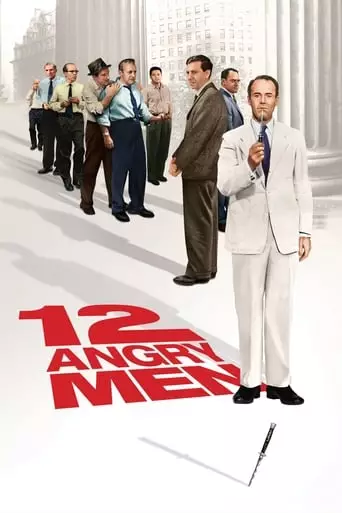The defense and the prosecution have rested and the jury is filing into the jury room to decide if a young Spanish-American is guilty or innocent of murdering his father. What begins as an open and shut case soon becomes a mini-drama of each of the jurors’ prejudices and preconceptions about the trial, the accused, and each other.
12 Angry Men (1957), directed by Sidney Lumet, is a powerful courtroom drama that revolves around the deliberations of a jury in a murder trial. The story begins with twelve jurors being tasked with determining whether a young man is guilty of murdering his father. The film is set almost entirely within the confines of a jury room, where the jurors debate the fate of the accused. The plot unfolds as Juror 8 (played by Henry Fonda) challenges the initial vote of “guilty,” arguing that there is reasonable doubt about the evidence. Over the course of the film, the jurors’ personal biases, prejudices, and character flaws are exposed, leading to a tense and thought-provoking exploration of justice and morality.
Plot Summary:
The film begins with a seemingly open-and-shut case in which an 18-year-old boy is accused of killing his father. The jury of twelve men, who initially vote overwhelmingly guilty, begins to change its stance after Juror 8 questions the validity of the evidence. He suggests that the boy may be innocent, which prompts an intense reexamination of the case. As the jurors continue to deliberate, tensions rise and personalities clash, revealing deeper societal issues such as prejudice, class, and personal responsibility. The film’s conclusion showcases how one individual’s resolve can lead to the transformation of the entire group.
Themes:
- Justice and Morality: “12 Angry Men” explores the complexities of the justice system, especially the importance of ensuring a fair trial. It highlights how prejudice and personal biases can affect decision-making, even in a seemingly straightforward case.
- Reasonable Doubt: A central theme is the concept of reasonable doubt. Juror 8’s insistence on thoroughly examining the case stresses that a guilty verdict must be certain beyond a reasonable doubt, a cornerstone of the legal system.
- Prejudice and Class: The jurors come from diverse backgrounds, and their personal biases and prejudices are revealed throughout the film. This theme underscores how societal divisions, such as race and class, can influence one’s perception of truth and justice.
- Peer Pressure and Group Dynamics: The film also examines the power of groupthink and the way individuals may change their opinions due to the influence of others. Juror 8’s quiet persistence contrasts with the more forceful personalities of the others, demonstrating the tension between standing up for what is right and succumbing to majority opinion.
- Moral Courage: Juror 8’s quiet yet determined stand against the initial verdict demonstrates moral courage, showing that doing what is right often requires standing alone against overwhelming opposition.
10 Reasons to Watch:
- Timeless Themes: The film’s exploration of justice, prejudice, and group dynamics remains relevant today.
- Strong Characterization: Each juror is distinct, with unique personalities and motivations that provide a rich portrayal of human nature.
- Intense Dialogue: The film is almost entirely dialogue-driven, making the conversations compelling and thought-provoking.
- Masterful Direction: Sidney Lumet’s direction creates a palpable sense of tension, despite the confined setting.
- Ensemble Cast: The film boasts an exceptional ensemble, with memorable performances by Henry Fonda, Lee J. Cobb, and E.G. Marshall.
- Cinematic Techniques: Lumet’s use of varying camera angles and close-ups intensifies the claustrophobic atmosphere of the jury room.
- Psychological Depth: The film delves deep into the psychology of its characters, particularly how stress, fear, and doubt manifest under pressure.
- Moral Dilemma: It explores the consequences of making difficult decisions in the pursuit of justice.
- Cultural Significance: “12 Angry Men” is considered one of the greatest films ever made and is often used in discussions of film history and legal studies.
- Thought-Provoking: The film challenges viewers to reflect on their own biases, beliefs, and views on justice.
Emotional Impact:
After watching 12 Angry Men, you will likely feel a mixture of admiration for the strength of moral conviction and frustration at the prejudices that can cloud judgment. The film’s slow unraveling of the case will keep you on edge, with the tension mounting as each juror’s biases are laid bare. By the end, you will likely feel a sense of relief and satisfaction, not only due to the resolution of the trial but also because of the transformation in the jurors, particularly Juror 8. Ultimately, the film invites you to reflect on your own values and how they influence your decisions and actions in the real world.
In conclusion, 12 Angry Men remains a powerful and enduring exploration of human behavior, justice, and moral responsibility. Its dialogue-driven format, strong performances, and tense atmosphere make it a must-watch for anyone interested in the dynamics of human interaction and the pursuit of truth

